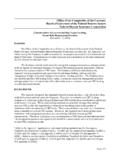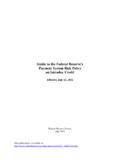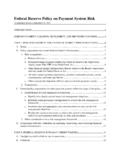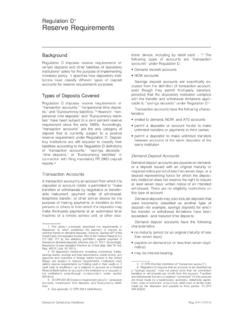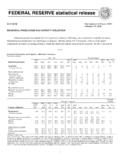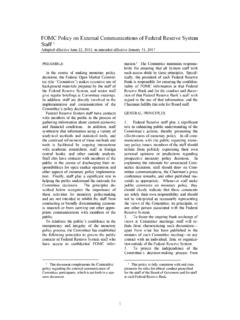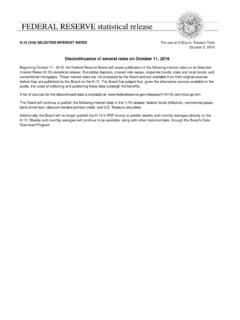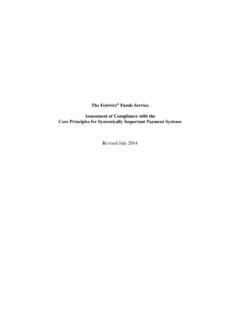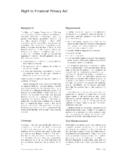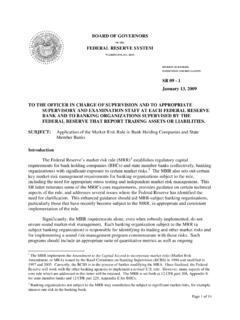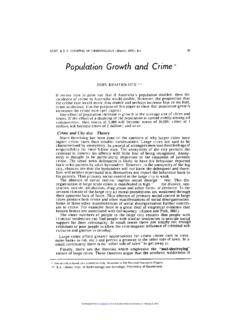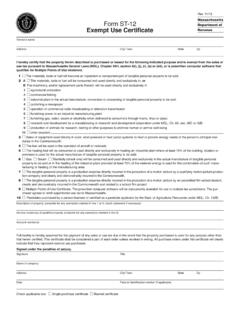Transcription of Know Your Customer’’ Section 601 - Federal Reserve
1 know your customer Section of the most important, if not the mostimportant, means by which financial institutionscan hope to avoid criminal exposure to theinstitution by customers who use the resourcesof the institution for illicit purposes is to have aclear and concise understanding of the custom-ers practices. The adoption of know yourcustomer guidelines or procedures by financialinstitutions has proven extremely effective indetecting suspicious activity by customers ofthe institution in a timely though not presently required by regu-lation or statute, it is imperative that financialinstitutions adopt know your customer guide-lines or procedures to ensure the immediatedetection and identification of suspicious activ-ity at the institution.
2 The concept of know yourcustomer is, by design, not explicitly definedso that each institution can adopt proceduresbest suited for its own operations. An effective know your customer policy must, at a mini-mum, contain a clear statement of manage-ment s overall expectations and establishspecific line responsibilities. While the officersand staff of smaller banks, Edge corporations,and foreign branches or agencies may havemore frequent and direct contact with customersthan large urban institutions, it is incumbentupon all institutions to adopt and follow policiesappropriate to their size, location, and type OF know YOURCUSTOMER POLICY A know your customer policy shouldincrease the likelihood that the financial insti-tution is in compliance with all statutes andregulations and adheres to sound and recog-nized banking practices.
3 A know your customer policy shoulddecrease the likelihood that the financial insti-tution will become a victim of illegal activitiesperpetrated by its customers. A know your customer policy that is effec-tive will protect the good name and reputationof the financial institution. A know your customer policy should notinterfere with the relationship of the financialinstitution with its good OF know YOURCUSTOMER POLICYIn developing an effective know your cus-tomer policy it is important to note thatappearances can be deceiving. Potential custom-ers of a financial institution may appear to belegitimate, but in reality are conducting illicitactivities through the financial institution.
4 Like-wise, legitimate customers may be turned awayfrom the institution because their activities areperceived to have a criminal tone. It is alsoimportant to realize that various influences onlegitimate customers may transform such cus-tomers into the present time there are no statutorilymandated procedures requiring a know yourcustomer policy or specifying the contents ofsuch a policy. However, in order to develop andmaintain a practical and useful policy, financialinstitutions should incorporate the followingprinciples into their business practices: Financial institutions should make a reason-able effort to determine the true identity of allcustomers requesting the bank s services; Financial institutions should take particularcare to identify the ownership of all accountsand of those using safe-custody facilities; Identification should be obtained from all newcustomers; Evidence of identity should be obtained fromcustomers seeking to conduct significant busi-ness transactions.
5 Financial institutions should be aware of anyunusual transaction activity or activity thatis disproportionate to the customer s integral part of an effective know yourcustomer policy is a comprehensive knowl-edge of the transactions carried out by thecustomers of the financial institution. Therefore,it is necessary that the know your customer procedures established by the institution allowfor the collection of sufficient information toBank Secrecy Act ManualSeptember 1997 Page 1develop a customer profile. The primaryobjective of such procedures is to enable thefinancial institution to predict with relative cer-tainty the types of transactions in which acustomer is likely to be engaged.
6 The customerprofile should allow the financial institution tounderstand all facets of the customer s intendedrelationship with the institution, and, realisti-cally, determine when transactions are suspi-cious or potentially illegal. Internal systemsshould then be developed for monitoring trans-actions to determine if transactions occur whichare inconsistent with the customer profile. A know your customer policy must consist ofprocedures that require proper identification ofevery customer at the time a relationship isestablished in order to prevent the creation offictitious accounts. In addition, the bank semployee education program should provideexamples of customer behavior or activity whichmay warrant THE CUSTOMERAs a general rule, a business relationship witha financial institution should never be estab-lished until the identity of a potential cus-tomer is satisfactorily established.
7 If a potentialcustomer refuses to produce any of therequested information, the relationship shouldnot be established. Likewise, if requestedfollow-up information is not forthcoming, anyrelationship already begun should be termi-nated. The following is an overview of generalprinciples to follow in establishing customerrelationships:Personal Accounts1. No account should be opened without satis-factory identification, such as: a driver s license with a photograph issuedby the State in which the bank is located;or a passport or alien registration card,together with: a college photo identification card; a major credit card (verify the currentstatus); an employer identification card; an out-of-State driver s license; and/or electricity, Consider the customer s residence or placeof business.
8 If it is not in the area served bythe bank or branch, ask why the customer isopening an account at that Follow up with calls to the customer s resi- dence or place of employment thanking thecustomer for opening the account. Discon-nected phone service or no record of employ-ment warrant further Consider the source of funds used to open theaccount. Large cash deposits should For large accounts, ask the customer for aprior bank reference and write a letter to thebank asking about the Check with service bureaus for indicationsthe customer has been involved in question-able activities such as kiting incidents andNSF The identity of a customer may be estab-lished through an existing relationship withthe institution such as some type of loan orother account A customer may be a referral from a bankemployee or one of the bank s acceptedcustomers.
9 In this instance, a referral alone isnot sufficient to identify the customer , but inmost instances it should warrant less vigi-lance than otherwise Accounts1. Business principals should provide evidenceof legal status ( sole proprietorship, part-nership, or incorporation or association) whenopening a business Check the name of a commercial enterprisewith a reporting agency and check prior Follow up with calls to the customer s busi-ness thanking the customer for opening theaccount. Disconnected phone service war-rants further When circumstances allow, perform a visualcheck of the business to verify the actualexistence of the business and that the busi-ness has the capability of providing theservices Consider the source of funds used to open theaccount.
10 Large cash deposits should For large commercial accounts, the followinginformation should be know your customer September 1997 Bank Secrecy Act ManualPage 2 a financial statement of the business; a description of the customer s principalline of business; a list of major suppliers and customers andtheir geographic locations; a description of the business s primarytrade area, and whether international trans-actions are expected to be routine; and a description of the business , retail versus wholesale, and the antici-pated volume of cash TRANSACTIONSIt is important to realize that relationships with afinancial institution that take a form other thandeposit accounts can be used for illicit transactions have become a common vehi-cle for criminal enterprises that wish to takeadvantage of the proceeds of their illegal activi-ties.
